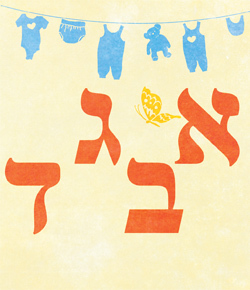
Just over three years ago, my father had to go to the hospital after he took too much of the medicine that was supposed to help his Parkinson’s disease. One day he was himself, and the next he was completely delusional. His behavior got worse once he was admitted; he became so combative that he had to be strapped to his hospital bed. My siblings and I apologized to the nurses on his behalf, but to them it was simple brain chemistry: too much medicine equals temporary insanity. They kept assuring us that it would take a few days, but that he would be fine.
He ended up staying in the hospital for a week. During that time, I wondered if the man with the encyclopedic mind would ever regain any semblance of it. Of all the things that only he knew, what I wanted most to retrieve from him was my sister Steffi’s Jewish name. Somehow, neither my mother nor my sister could be sure of it.
Fortunately, the nurses’ predictions were correct. Slowly he returned to his right mind, and we were all smiles when he left the hospital like nothing ever happened. I don’t need to tell you how this personal episode of The Twilight Zone gave me a new appreciation for Modeh Ani, the prayer said upon awakening, thanking G‑d for fully returning our souls to our bodies.
“You just took too much medicine,” we assured my father when he asked what he was doing in the hospital. “But you’re fine now.”
As quickly as I could, though, I confirmed a few essential facts: where at least some of his family originated (Ozeran, a shtetl near Minsk) and, of course, my sister’s Jewish name (Simcha Gittel).
His mind stayed sharp, but his body continued to decline as it had been doing for years. Six months after that hospital stay, my father passed away at home, quietly and without fanfare. As his aide Moishe tried to revive him, I whispered his Jewish name into his ear: Avraham Gershon ben Leah Rudda.
I had heard that a person’s name is connected to his essence, and I knew that hearing it could arouse something deep within him. Even though throughout his long life the name Avraham Gershon remained largely dormant within him, that name still defined his essence. And that’s what I tried to reach.
Jewish names are paradoxical. On one hand, a name appears to be superficial. On the other, the unique arrangement of the letters of our Jewish name forms the pipeline through which our very soul enlivens our bodies. Our name is the most outer manifestation of who we are, yet it is connected to our innermost selves.
I don’t remember when I asked my parents what my Jewish name was, but very soon after we became observant, I knew I wanted to use it. I needed all the spiritual help I could get, and calling myself by the name that’s connected to my soul seemed like an easy place to start. If G‑d calls me Lieba Yosefa, shouldn’t everybody? (Okay, maybe not Yosefa.)
I look back on the the naming of our children, remembering the drama before each name was decided. The first three kids have English and Hebrew names. By the time the next two were born, we were naming them only in Hebrew. The game-changer was our daughter Chaya Mushka, named after the Rebbe’s wife. I remember the conversation I had with my father, who initially protested a name which sounded so, so Jewish. It’s not easy to blend into the secular world with a name like Chaya Mushka.
“Why not Leah or Sara?” he asked, hoping to reach a compromise.
“Daddy, we already used those names,” I reminded him.
I pleaded with my father in a way that only a daughter can, and he acquiesced.
Chaya Mushka was a momentous name for our family. As I understood it, it was due to the Rebbetzin’s selflessness that the Rebbe was able to devote so much time to his followers. What better way to thank her for our family’s gift of Torah life than to name our daughter after her? Trust me, when you call your daughter “Mushkie,” you say “Chabad” wherever you go.
Mushkie’s unique connection to my father didn’t end with her naming. Mushkie had her first date with Nisson as soon as shivah for my father ended. They were married three months later, and just after their first anniversary they had a baby boy. They call him Avremi, short for Avraham Gershon.
I was surprised Mushkie and Nisson chose this name over a recognizable Chabad name. It took a leap on their part, not unlike the one my husband and I took when Mushkie was born.
It’s unclear yet whether Avremi will have any outward similarities to his great-grandfather, but he undeniably shares the same soul power.
People with the name Avraham are said to be predisposed to kindness, as our original forefather was. Little Avremi is off to a good start; his name alone has brought happiness to a lot of people in this world.
And I can’t even begin to imagine the joy my father is experiencing in the next world.




